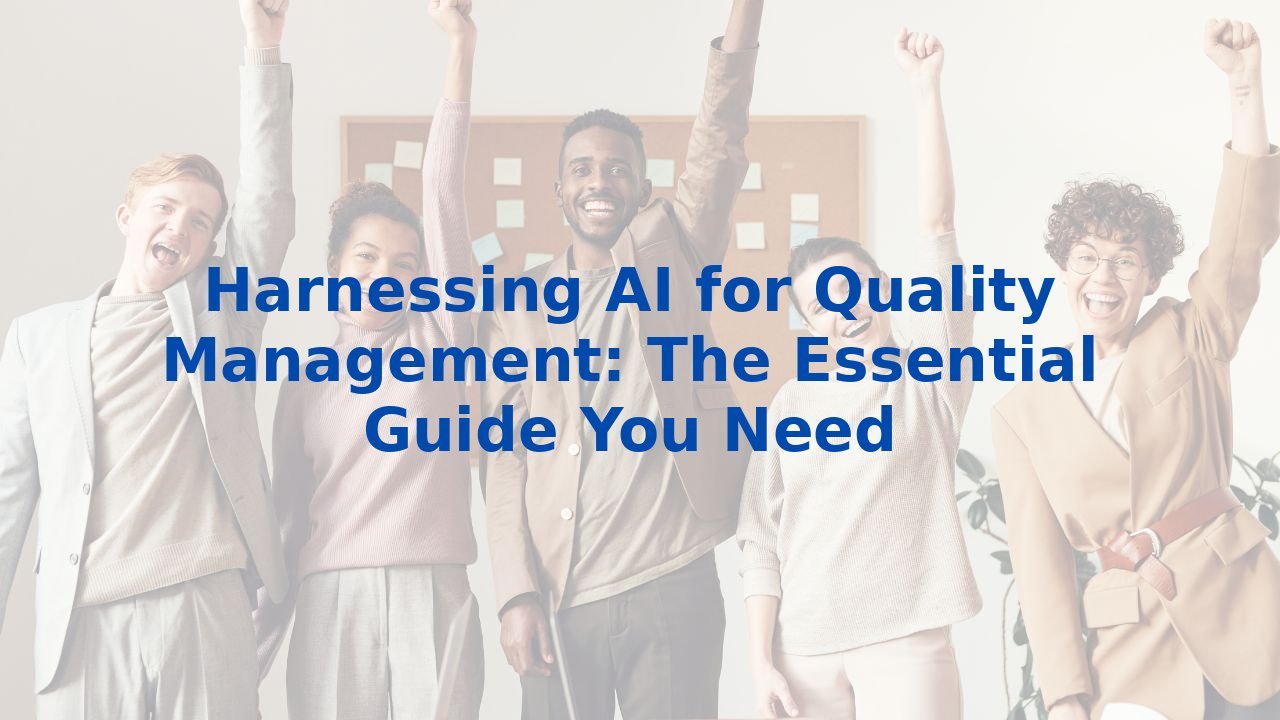Harnessing AI for Quality Management: The Essential Guide You Need
Harnessing AI for Quality Management: The Essential Guide You Need
In today's rapidly evolving business landscape, maintaining high standards of quality management is crucial for success. Yet, many organizations still grapple with traditional methods that can be inefficient and prone to errors. Enter Artificial Intelligence (AI)—a transformative tool that harnesses data and analytics to enhance business processes and drive efficiency in quality management. This guide explores how AI can reshape your quality management processes and the potential benefits of investing in training your workforce to effectively integrate AI into daily operations.
The Role of AI in Quality Management
Quality management encompasses a wide array of processes, including quality planning, quality assurance, quality control, and quality improvement. AI can significantly enhance each of these areas by automating tasks, reducing human error, and providing real-time insights that lead to better decision-making.
Quality Planning
During the quality planning phase, organizations establish quality standards and identify the necessary processes to meet those standards. AI can streamline this phase by analyzing historical data and predicting potential quality issues before they arise. Machine learning algorithms can sift through mountains of data to uncover patterns, enabling teams to set more realistic and informed quality benchmarks.
Quality Assurance
Quality assurance focuses on the processes that lead to product or service excellence. With AI at the forefront, organizations can leverage predictive analytics to identify areas in the workflow that may compromise quality. For instance, AI-powered tools can monitor production lines, detecting anomalies in real-time and ensuring intervention before defects occur. This proactive approach reduces waste and saves costs while enhancing overall product quality.
Quality Control
Quality control is the check-and-balance phase, involving systematic testing and inspection. AI technologies can elevate this process by automating inspections through computer vision. Consider an AI system that analyzes images from production lines to detect defects faster than any manual process could. When the process is automated, employees can focus on resolving issues rather than merely identifying them, fostering a culture of continuous improvement.
Quality Improvement
Integrating AI into quality management doesn't end with detection. Its true potential lies in enabling organizations to innovate continually and enhance their processes. By analyzing customer feedback and product performance data, AI can highlight areas for improvement that may not have been visible before. This level of insight allows for targeted enhancements that can significantly elevate customer satisfaction.
The Efficiency Imperative
The integration of AI into quality management processes inevitably leads to increased efficiency. By automating repetitive tasks, reducing error rates, and generating valuable insights from data, organizations can allocate their resources more effectively. Employees can shift their focus from mundane tasks to strategic initiatives that drive growth and innovation. Moreover, a well-implemented AI strategy leads to quicker decision-making and swift accommodating to market changes, ensuring your business stays ahead of the competition.
Training Your Employees in AI
While AI presents immense opportunities, its successful adoption relies heavily on the ability of your workforce to leverage these technologies effectively. Businesses that invest in training their employees for AI not only empower their staff but also create a more agile organization. Training ensures that teams understand how to utilize AI tools, interpret data insights, and integrate these learnings into their daily practices. This investment in human capital turns potential resistance into readiness for change.
The Benefits of AI Training
When organizations opt for a comprehensive AI training program, they reap several benefits. Employees gain the skills needed to harness AI technologies, which leads to greater job satisfaction and personal growth. Additionally, as your team becomes proficient in AI, they contribute to fostering an innovation-driven culture that is essential in today’s fast-paced environment.
Conclusion
Harnessing AI for quality management is not just a trend; it's an essential strategy for businesses looking to thrive in a competitive landscape. By enhancing planning, assurance, control, and improvement processes, AI drives efficiency and elevates product and service standards. The investment in training is a crucial part of this journey—the better equipped your team is, the more powerful your organization will be in leveraging AI for lasting success. Embrace the future and unlock the transformative potential of AI in quality management for your organization today.



